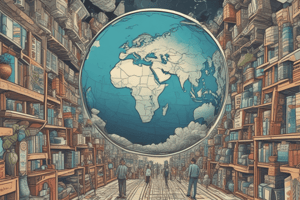Podcast
Questions and Answers
What does economic development primarily focus on?
What does economic development primarily focus on?
- Decreasing employment opportunities
- Increasing inflation rates
- Expanding GDP per capita (correct)
- Limiting international trade
Which of the following is a key factor influencing economic development?
Which of the following is a key factor influencing economic development?
- Decreased investment in all sectors
- Increased unemployment rates
- Reduced opportunities for upward mobility
- Capital accumulation in physical, human, and technological forms (correct)
In the context of economic development, what does the Human Development Index (HDI) measure?
In the context of economic development, what does the Human Development Index (HDI) measure?
- Life expectancy, education, and per capita income indicators (correct)
- GDP growth rate
- International trade balance
- Income inequality
Which of the following is an essential sector for economic development according to the text?
Which of the following is an essential sector for economic development according to the text?
What is the role of the United Nations Development Programme in economic development?
What is the role of the United Nations Development Programme in economic development?
Why is capital accumulation significant for economic growth and development?
Why is capital accumulation significant for economic growth and development?
What is the most common measure of economic growth mentioned in the text?
What is the most common measure of economic growth mentioned in the text?
Which factor can drive economic growth even with rapid population growth?
Which factor can drive economic growth even with rapid population growth?
What is the purpose of measuring Real GDP instead of Nominal GDP?
What is the purpose of measuring Real GDP instead of Nominal GDP?
Which factor is NOT mentioned as influencing economic growth in the text?
Which factor is NOT mentioned as influencing economic growth in the text?
What role do good governance and institutions play in economic development?
What role do good governance and institutions play in economic development?
Why is a skilled and educated workforce mentioned as driving growth in the text?
Why is a skilled and educated workforce mentioned as driving growth in the text?
Study Notes
Macroeconomics: Understanding Economic Development and Growth
Macroeconomics is the branch of economics that studies large-scale economic patterns and behaviors, focusing on topics such as economic growth, employment, inflation, and international trade. In the realm of macroeconomics, our focus today will be on economic development and growth.
Economic Development
Economic development is the process by which a country improves its standard of living for its population. It refers to the expansion of gross domestic product (GDP) per capita, raising the income of the average citizen, and increasing opportunities for upward mobility. Economic development is a multifaceted concept, encompassing advancements in various sectors like agriculture, industry, services, infrastructure, and education.
The most common framework for measuring economic development is the Human Development Index (HDI), a composite index of life expectancy, education, and per capita income indicators. The HDI is used by the United Nations Development Programme to rank countries' overall achievements in human development, highlighting disparities and promoting efforts to reduce them.
Factors Affecting Economic Development
Several key factors influence economic development, including:
- Investment: Capital accumulation in physical, human, and technological forms has a direct impact on economic growth and development.
- Population growth: Rapid population growth can place pressure on resources and infrastructure, impeding development. However, a skilled and educated workforce can also drive growth.
- Trade and globalization: Participation in international trade and investment can speed up economic development, facilitating the transfer of technology, capital, and skills.
- Governance and institutions: Sound institutions, good governance, and the rule of law are essential for attracting investment, protecting property rights, and promoting economic development.
Measuring Economic Growth
Economic growth refers to the increase in a country's GDP over time. GDP is the total monetary value of all final goods and services produced within a country's borders in a specific time period. The most common measure of economic growth is the GDP per capita, which is calculated by dividing GDP by the population.
Economic growth can be measured in different ways:
- Nominal GDP: The total monetary value of all final goods and services produced within a country's borders in a specific time period, without adjusting for inflation.
- Real GDP: The total monetary value of all final goods and services produced within a country's borders in a specific time period, adjusted for inflation. This measure allows us to compare the value of goods and services across different time periods.
Factors Affecting Economic Growth
Several key factors influence economic growth, including:
- Investment: Similar to economic development, capital accumulation in physical, human, and technological forms has a direct impact on economic growth.
- Population growth: Rapid population growth can place pressure on resources and infrastructure, but not necessarily impede growth if accompanied by technological progress and investment.
- Trade and globalization: Participation in international trade and investment can speed up economic growth, facilitating the transfer of technology, capital, and skills.
- Innovation: Technological progress, the development of new products and processes, and increases in productivity are essential drivers of economic growth.
Macroeconomics help us understand economic development and growth, informing policy decisions that can enhance a country's standard of living. By examining the key factors driving economic growth and development, policymakers can develop strategies to promote sustainable, inclusive, and equitable economic progress.
Studying That Suits You
Use AI to generate personalized quizzes and flashcards to suit your learning preferences.
Description
Test your knowledge on economic development and growth in the field of macroeconomics. Explore concepts such as factors influencing economic development, measuring economic growth, and the role of investment, population growth, trade, and innovation in shaping a country's economy.




